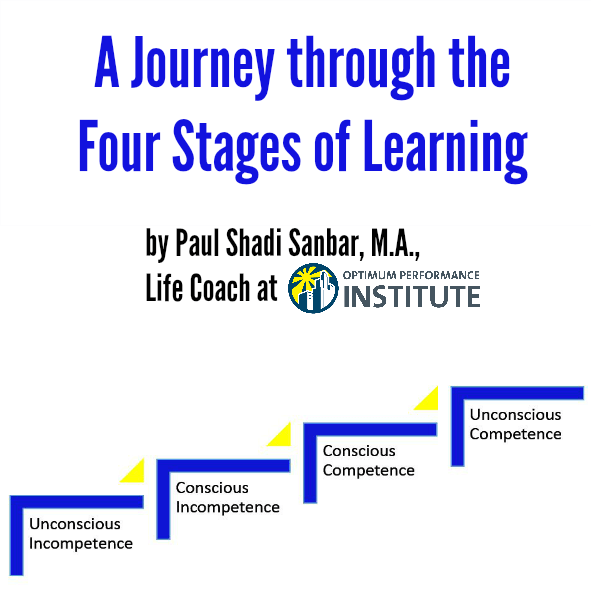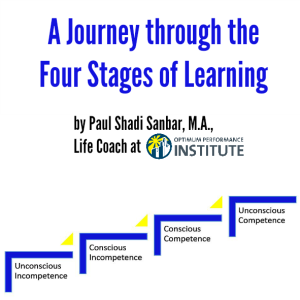
A Journey through the Four Stages of Learning (Developed by Noel Burch)
 Walk alongside the team at Optimum Performance Institute as we explain the Four Stages of Learning and how we impact young people at every step along their life’s journey.
Walk alongside the team at Optimum Performance Institute as we explain the Four Stages of Learning and how we impact young people at every step along their life’s journey.
First, imagine as if you were a 10-month old baby. If just for a moment, envision yourself in those shoes, or booties if you will. Peering out from your stroller into the expansive and ever-changing world, you’re being pushed along a busy sidewalk; people darting in and out of your path. In front of you, a man holding his briefcase in one hand and a cup in another, with agility unknown to you, sidesteps another person walking without looking. His body contorts left while simultaneously one arm extends out for balance while the other arm, coffee in hand, compensates and not even a single drip spills onto the curb. Young kids, not much older than you, moving towards their future, eyes glued to the phone screen, typing a message, not even considering that for a brief moment in time that their amazing movement, their dance of a thousand steps, we refer to as simply walking, was at one point an unconscious dream to them as well.
As this commotion of locomotion abounds, just then, you look down at your legs, more pudge than muscle. Your little feet, soles so smooth, have never had a reason to consider the need to put one in front of the other in any fashion. Looking out from that baby buggy, would you ever think that you could do any of that? If that baby we are all imagining actually knew about the multitude of moving parts it takes just to take a step or if they knew that the very first time they tried to take that step, they’d fall flat on their face, they’d probably never even think about getting out of that stroller in the first place.
FIRST STAGE OF LEARNING
Fortunately, this first stage of learning, Unconscious Incompetence, means quite simply: you don’t know what you don’t know. This lack of awareness is both a blessing and a curse. It allows an individual to believe that they can and should get out of that stroller and take their first step, but it also fools them into believing that they can run before they can effectively walk.
This is where OPI makes its initial mark with the young adults in our program. Many participants we serve have learned to march through life and have made many strides, but their unbalanced gait has caused a plethora physical break-downs along their young life’s journey. Sprained ankles from missteps causing emotionally sore muscles confound them. Whether they are trying to complete college, find a career or just find themselves, in order to learn a new life skill, it is important for a person to recognize his or her inability to perform the skill fruitfully.
This initial stage begins to culminate when awareness occurs. Informing and sharing in this recognition often falls on the teacher or in this case, the participant’s therapist and the entire therapeutic team. This is where the ability to effectively empathize and also hold up the mirror to the young adult’s style of movement is paramount to learning and sometimes relearning how to walk.
SECOND STAGE OF LEARNING
It is at this point where we now know what we don’t know. This is the second stage of learning: Conscious Incompetence. This is the most uncomfortable stage in learning. This is where you might develop a belief that you are a failure in a certain activity. Shame may arrive from the acknowledgment of your shortcomings and as it builds, you could possibly just stop trying altogether.
Many of our participants arrive at OPI mired in the muck of this stage having already realized that they don’t know what they don’t know. For them, the duration of their stay in the conscious incompetence stage depends on their learning determination, as well as the acceptance and acknowledgment of their incompetence. Easier said than done.
This is why the team concept at OPI plays such an important role with our participants. Whether it’s one of our Counselors in the Career and Volunteering department preparing a participant for a job with mock interviews, a Life Coach educating and modeling independent living skills or the Educational Counselors helping to reinvigorate the participant’s thirst for knowledge, the professionals at OPI meet them where they are at and gently guide them through the myriad of failed attempts at growth and a failure to launch into college, work, or close relationships.
Many times they might take that next step up the learning ladder, and many times they might fall backwards. OPI is here to catch them each and every time and then help process what went right and what went wrong. Through that process, learning truly occurs, and then one day, a step up is made and footing has secured.
THIRD STAGE OF LEARNING
This is learning stage three: Conscious Competence. This is where you now know what you don’t know, you’re integrating it into your life, but it’s far from consistent or habitual. This is where the daily process groups, the workshops, the vast array of planned social activities and the DBT coursework allows for fruitful integration. This is also where the Independent Living Specialists living with the participants help create that environment for the incorporation of healthy activities into life affirming habits. As they stretch upward, the participants begin to see themselves as they really want to be, but they also come up against the truth that the development of competence is usually faster than the development of consciousness. Meaning: progress is slow. This might be where the participants have a steady pace, but are no longer shaving large chunks off of their race times, to continue the metaphor.
It is at this point where true change occurs and where the positive reinforcement and nurturing atmosphere of the program really shows its mettle. The young adult often wants everything to change, and they want everything to change now. In stage three, they learn that it is truly not a race to the finish. This is where they learn to stop and take a breath. This is where the missteps of life, which happen to all of us, no longer mean more than they actually mean; where participants have internalized the ability to catch themselves before they fall all the way down the mountain. Therapists have helped them work through past issues that limit true assimilation into a fruitful present. Life Coaches have helped them discover and develop a reason to be; a future state where contentment works alongside of action. OPI’s therapeutic team both holds up the tape at the end of the marathon and cheers the participants on each step of the way until mastery is attained.
FOURTH STAGE OF LEARNING
Now, the skills are habitual or automatic for the participants, so the conscious mind can focus on others things while the participant demonstrates the life skill. This is Unconscious Competence. This is the fourth and final stage, the ultimate goal for all of our participants, for all of us for that matter. This is where you no longer have to think about what you know, you know it and you know why it serves you.
As our participants achieve this final stage, they have now learned to navigate their own journey and have chosen the destination that gives their life meaning. It is then when they also have the awareness that they will most likely stumble again or even sprain their ankle once in a while. Except this time, they also know how to mend themselves, get back up and just keep walking.
by Paul Shadi Sanbar, M.A., Life Coach
For more information, call us at (888) 814-5985 or click HERE to submit an online form. We’ll be in touch promptly.
